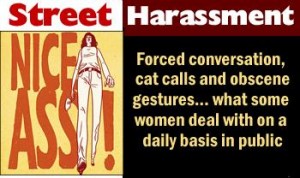Overview:
While there is no standardized definition for street harassment (yet), our working definition (updated March 2015) is:
Gender-based street harassment is unwanted comments, gestures, and actions forced on a stranger in a public place without their consent and is directed at them because of their actual or perceived sex, gender, gender expression, or sexual orientation.
Street harassment includes unwanted whistling, leering, sexist, homophobic or transphobic slurs, persistent requests for someone’s name, number or destination after they’ve said no, sexual names, comments and demands, following, flashing, public masturbation, groping, sexual assault, and rape.
Of course, people are also harassed because of factors like their race, nationality, religion, disability, or class. Some people are harassed for multiple reasons within a single harassment incident. Harassment is about power and control and it is often a manifestation of societal discrimination like sexism, homophobia, Islamophobia, classism, ableism and racism. No form of harassment is ever okay; everyone should be treated with respect, dignity, and empathy.
Street harassment is a human rights issue because it limits harassed persons’ ability to be in public, especially women’s. Read the United Nations’ stance on the issue.
The mobility of all members of the LGBQT community is often restricted as well because of harassment and hateful violence motivated by the person’s actual or perceived gender expression or sexual orientation. For example, a 2013 study of 93,000 LGBQT individuals in the European Union found that half avoided public spaces sometimes because of street harassment and most reported high levels of fear in locations like restaurants, public transportation, streets, parking lots, and parks.
Street harassment often begins around puberty.
* In a 2014, nationally representative survey of street harassment in the USA, half of harassed persons were harassed by age 17.
* In an informal international online 2008 study of 811 women conducted by Stop Street Harassment, almost 1 in 4 women had experienced street harassment by age 12 (7th grade) and nearly 90% by age 19.
While street harassment often occurs on a more frequent basis for teenagers and women in their 20s, the chance of it happening never goes away and women in their 80s have shared stories.
 Definitions of street harassment.
Definitions of street harassment.
Studies and statistics about street harassment.
Resources to learn more.
Strategies for dealing with harassment
Ideas for ending street harassment
More Reading:
Christian Science Monitor, “Street harassment of women: It’s a bigger problem than you think”
The Guardian, “Feeling harassed? Do something about it”
Medium.com, “Five Reasons Why Street Harassment is Serious”
Feministe, “Harassing Men on the Street“
Note: While women also may harass men in public, gender inequality means that the power dynamics at play, frequency of the harassment, the underlying threat of rape, and the impact on the harassed person’s life is rarely comparable. For these reasons, the work of Stop Street Harassment focuses mostly on men harassing women (cis and transwomen) or people perceived to be female, with secondary focus on the harassment of LGBQT individuals as a whole.
Also, while public harassment motivated by racism, homophobia, transphobia, or classism—types of deplorable harassment which men can be the target of and sometimes women perpetrate—is recognized as socially unacceptable behavior, men’s harassment of women motivated by gender and sexism is not. Instead it is portrayed as complimentary, a joke, or “only” a trivial annoyance. Plus people tend to blame women for its occurrence based on what they are wearing or what time of day they are in public. Additionally, there are already many great groups working to address the other forms of harassment, but there are few addressing gender-based harassment. These are additional reasons why Stop Street Harassment focuses on this type of harassment – but is an ally to all groups and people working to end every type of harassment.
